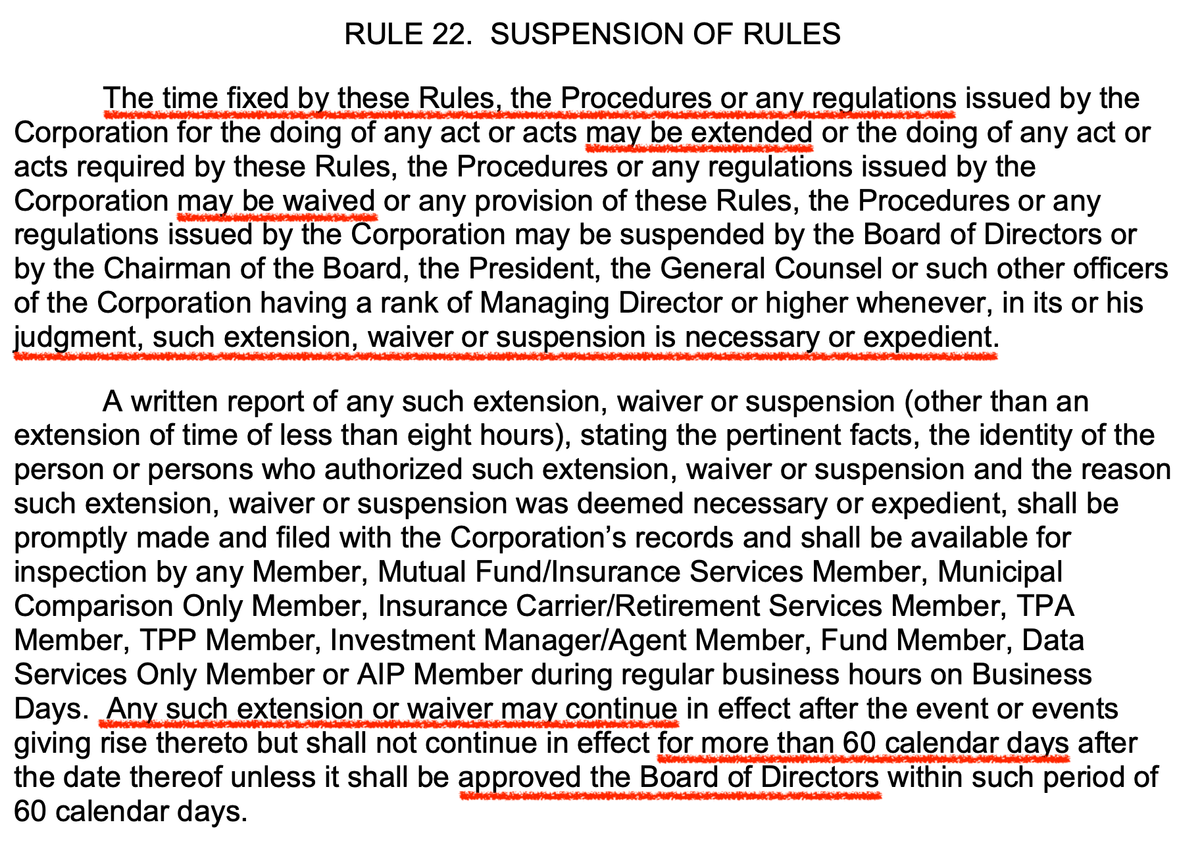Commodity Futures Trading Commission (CFTC) Alert! CFTC approves FINAL rule on Governance Requirements for Derivatives Clearing Organizations. Derivatives clearing organizations need all these in changed in place by 1. July 12, 2024.

Source: https://public-inspection.federalregister.gov/2023-14361.pdf
Highlights:
- Derivatives clearing organizations (DCO)s will now have to set up and consult with one or more risk management committees (RMCs). These committees will be made up of clearing members and their customers. The idea is to involve these groups in discussions about anything that could significantly change the DCO's risk profile.
- The CFTC is setting some rules for who can be on these RMCs and how often the members should rotate. They're also requiring DCOs to set up standards to determine who's fit to serve on these committees.
- DCOs will need to have written policies and procedures about how they consult with the RMCs and what role the RMC members play.
- DCOs will also have to set up one or more market participant risk advisory working groups (RWGs). These groups will need to meet at least twice a year. Again, DCOs will need to have written policies and procedures about how these groups are formed and what their role is.
- All these changes need to be in place by July 12, 2024.


Wut mean?
- The Commodity Exchange Act (CEA) has a section (5b(c)(2)) that outlines core principles for Derivatives Clearing Organizations (DCOs). These principles are necessary for a DCO to register and maintain its registration. One of these principles, DCO Core Principle O, requires a DCO to have transparent governance arrangements that consider the views of owners and participants and fulfill public interest requirements.
- Regulation § 39.24 implements this principle by setting minimum requirements for a DCO’s governance arrangements. In August 2022, the Commodity Futures Trading Commission (CFTC) proposed several amendments to this regulation to enhance the governance standards for DCOs. The aim was to improve transparency, public interest requirements, and the involvement of owners and participants in DCO risk management.
- The proposed changes included requiring each DCO to establish one or more Risk Management Committees (RMCs) and Risk Advisory Working Groups (RWGs). The RMCs would consult with the DCO's board on matters that could significantly affect the DCO's risk profile. The RWGs would seek risk-based input from a wider range of market participants.
- The comment period for these proposed changes ended on October 11, 2022. The CFTC received 18 substantive comment letters.

- After considering these comments, the CFTC is adopting the proposed changes with some modifications.

Proposed § 39.24(b)(11):

- The proposed § 39.24(b)(11) regulation would require Derivatives Clearing Organizations (DCOs) to establish one or more Risk Management Committees (RMCs). The DCO's board of directors would need to consult with and respond to the RMC(s) on matters that could significantly impact the DCO's risk profile. This includes changes to the DCO's margin model, default procedures, participation requirements, risk monitoring practices, and the clearing of new products.
While many organizations, including Barclays, BlackRock, CME, Eurex, FIA, ICE, ISDA, Nodal, OCC, Paolo Saguato, and SIFMA AMG, generally support the proposed regulation, CME suggested a modification.
- They proposed that the board should be required to consult with and respond to "risk-based" input, rather than commercially-driven input, from the RMC. CME argued that it's crucial to ensure that market participants acting as RMC members prioritize the safety and efficiency of the DCO and support the stability of the broader financial system.
- FIA and SIFMA AMG suggested that the Commission should modify the proposed § 39.24(b)(11) to mandate Risk Management Committees (RMCs) to meet at least quarterly. They also recommended that Derivatives Clearing Organizations (DCOs) should provide regular written risk reports to RMC members between meetings. Additionally, they suggested that RMCs should include specific topics such as stress testing results, sensitivity analysis, and financial resources as standing agenda items.
- ForecastEx and NADEX supported the RMC concept but argued that applying the proposed RMC requirements to DCOs that only clear fully collateralized positions would be pointless. They reasoned that these DCOs carry no credit risk, which eliminates or minimizes the significance of margin models, default procedures, participation requirements, and risk management procedures.
- Intercontinental Exchange, Inc. (ICE) and Options Clearing Corporation (OCC) requested clarification from the Commission on whether the proposed § 39.24(b)(11) would allow a DCO to structure its RMC as either an advisory committee or a board-level committee.
- ICE, which operates four registered Derivatives Clearing Organizations (DCOs), argued that a DCO should have the flexibility to structure its Risk Management Committee (RMC) as either an advisory committee or a board-level committee. This decision, according to ICE, should depend on each DCO's size, markets, business model, and other regulatory requirements. Some of ICE's DCOs have an advisory RMC that makes recommendations to the board, while others have a board-level RMC that has been delegated governance and oversight responsibilities over the DCO’s risk management function by the board.
- OCC also noted that it has delegated its risk management responsibilities to several board-level committees, each with a specific subject matter responsibility. These committees mostly make recommendations to the board, and in some cases, may act on behalf of the board through delegated authority.
OCC has requested that the Commission collaborate with the Securities and Exchange Commission (SEC) to resolve a potential conflict between the proposed § 39.24(b)(11) and recently proposed SEC regulations. OCC believes that while the proposed § 39.24(b)(11) requires a Risk Management Committee (RMC) to be an advisory committee, the SEC Proposal requires an RMC to be a committee of the board of directors.
- Furthermore, OCC has asked the Commission to clarify that a Derivatives Clearing Organization (DCO) would be allowed under the proposed rules to delegate various risk management responsibilities to multiple committees (such as an Audit Committee overseeing legal and compliance risk, and a Technology Committee overseeing information technology and security risks), rather than using a single body labeled "risk management committee". This is provided that these bodies each meet the requirements of an RMC.
- The International Swaps and Derivatives Association (ISDA) suggests including "rule enforcement policy" and "public information policy"
- On the other hand the Futures Industry Association (FIA) recommends adding "outsourcing function", "system safeguards", "access models", "liquidity risk", "financial resources", and "non-default procedures".
Cboe Digital has suggested that the Commission should eliminate the list of matters that could significantly impact the risk profile of a Derivatives Clearing Organization (DCO).
- Instead, it proposes that DCOs should be required to establish policies and procedures to determine whether a matter could affect their risk profile.
- Cboe Digital argues that the current list is broad and undefined. If the Commission decides to retain the list, Cboe Digital recommends that the matters included should be more narrowly defined.
- Specifically, it raises the question of whether a material change to one of the listed matters, which is not risk-based, would still need to be reviewed by the Risk Management Committee (RMC).
- OCC has suggested that the Commission remove "new products" from the list of factors that could significantly impact a Derivatives Clearing Organization's risk profile. However, if the Commission decides to keep "new products" in the final rule, the OCC requests that it be limited to new "asset classes". Alternatively, the OCC suggests defining a subset of "new products" that would only include those with materially different margining, liquidity, default management, pricing, or other risk characteristics from those currently cleared by the Derivatives Clearing Organization.
The Commission agrees with CME's suggestion that market participants serving on a Risk Management Committee (RMC) should provide risk-based input and prioritize the safety and efficiency of the Derivatives Clearing Organization (DCO) and the stability of the broader financial system, rather than their own commercial interests.
- However, the Commission declines to modify the proposed rule to require a DCO’s board of directors to only respond to risk-based input. The Commission believes that a DCO’s board cannot reliably determine whether input from RMC members is motivated by their views on the DCO's safety and financial stability, or by their firm's commercial interests.
- Therefore, for transparency, a DCO’s board must respond to all substantive input from the RMC on its merits. If a DCO’s board believes that RMC input is incorrect or misguided, the board should note that in its response.
The Commission has responded to suggestions by FIA and SIFMA AMG that Risk Management Committees (RMCs) should be required to meet at least quarterly. While the Commission agrees that RMCs generally need to meet this often to consult on matters that could materially affect the risk profile of the Derivatives Clearing Organization (DCO), they do not wish to impose unnecessary meetings in unusual circumstances where material risk issues allow for more than three months between meetings. Therefore, the Commission will not modify the proposed rule to require quarterly RMC meetings.
- The Commission also declines FIA's suggestion to require DCOs to provide regular written risk reports to RMC members between meetings. They believe that DCOs should have the flexibility to determine the best method of communication with their RMC members. Similarly, the Commission will not require RMCs to have certain topics as standing items on their agenda, as they believe the RMC is best positioned to identify the most pertinent risks and design their meeting agenda accordingly.
The Commission concurs with ForecastEx and NADEX that a Derivatives Clearing Organization (DCO) that mandates full collateralization of positions before trade execution has effectively eliminated the credit risk associated with those positions. This, in turn, diminishes or nullifies the importance of risk management issues such as margin models, liquidity risk management, guaranty funds, stress testing, default procedures, and participation requirements.
- The Commission understands that these are the main topics where Risk Management Committees (RMCs) and Risk Working Groups (RWGs) contribute to DCO risk management.
- The Commission acknowledges that fully collateralized Derivatives Clearing Organizations (DCOs) still face operational, legal, and other risks that could materially affect their risk profiles. However, given the reduction of many risks and the significant decrease in issues for any Risk Management Committee (RMC) to address, the Commission believes it's not appropriate to require these DCOs to bear the costs associated with maintaining RMCs and Risk Working Groups (RWGs) that meet the requirements of this final rule. Therefore, the Commission is adopting new § 39.24(d) to allow a DCO to meet the requirements of paragraphs (b)(11), (b)(12), (c)(1)(iv), and (c)(3) of § 39.24 by only clearing fully collateralized positions. This is consistent with previous exemptions the Commission has granted to fully collateralized DCOs from certain risk-related requirements.
- In response to ICE and OCC's request for clarification on whether a Derivatives Clearing Organization (DCO) can structure its Risk Management Committee (RMC) as either an advisory committee or a board-level committee, the Commission confirms that a DCO has the flexibility to design its governance arrangements in a way that best fits its unique structure, provided it meets the minimum requirements set forth in § 39.24. Therefore, a DCO can structure its RMC as either an advisory committee or a board-level committee to satisfy the requirements of § 39.24(b)(11). Furthermore, the Commission confirms that a DCO can delegate various risk management responsibilities to multiple committees, rather than a single body labeled "risk management committee," as long as each committee complies with the requirements of § 39.24.
- The Commission confirms that § 39.24(b)(11) allows for the possibility of "one or more" risk management committees within a Derivatives Clearing Organization (DCO). Regarding the non-exhaustive list of matters that could significantly impact the DCO's risk profile, the Commission maintains that the proposed list offers appropriate guidance to DCOs on matters that require consultation with the Risk Management Committee.
The Commission has responded to suggestions from FIA and ISDA for additional topics to be included in § 39.24(b)(11). The Commission emphasizes that the list of topics is illustrative and not exhaustive, and all matters that could significantly affect the DCO's risk profile are subject to consultation, regardless of whether they fit into a listed category.
- Therefore, it's not necessary to include all potential categories of issues.
- In response to Cboe Digital's request for clarification, the Commission states that a material change to one of the listed matters that doesn't involve risk issues wouldn't necessarily need to go to the Risk Management Committee (RMC). The board is only required to consult with its RMC(s) on matters that could materially affect the DCO's risk profile.
New Products:


The Commission maintains that a Derivatives Clearing Organization (DCO)'s board should consult with its Risk Management Committee (RMC) if the launch of a new product could significantly affect the DCO's risk profile. While acknowledging that many new contracts are similar to existing ones, the Commission agrees with comments that DCOs are best placed to determine what constitutes a new product.
- The Commission expects each DCO to define in its policies and procedures what it means to "materially affect the risk profile of the DCO."
- It believes that the factors it identified for determining whether a new product could significantly affect the DCO's risk profile (different margining, liquidity, default management, pricing, or other risk characteristics from products already cleared) are a good starting point for DCOs as they draft or update their policies and procedures in this area.
- The Commission is revising § 39.24(b)(11) to clarify that a Derivatives Clearing Organization (DCO)'s board must consult with its Risk Management Committee (RMC) on matters that could materially affect the DCO's risk profile, including the clearing of new products. This revision is in response to confusion in the comments about whether the requirement was for all new products or only those that could significantly affect the DCO's risk profile.
- The updated rule text specifies that the requirement applies to new products that could materially affect the risk profile of the DCO.
Policies and Procedures Governing RMC Consultation – § 39.24(b)(11)(i)

The Commission continues to believe that explicitly requiring DCOs to develop and maintain policies and procedures governing DCO consultation with its RMC(s), and to document the board’s consideration of and response to RMC input, will promote transparency, accountability, and predictability, and facilitate effective oversight by the Commission in this area.
The Commission declines to adopt a requirement that would make a DCO share its response to RMC input with all market participants.
Meeting Minutes:

In response to ISDA’s suggestion that a DCO should be required to publish a public summary of RMC meetings, the Commission declines to adopt such a requirement at this time in order to preserve a DCO’s ability to protect sensitive information
Representation of Clearing Members and Customers on RMC – § 39.24(b)(11)(ii):


In response to NADEX’s suggestion that the proposed requirement should not apply to “retail focused” DCOs, the Commission does not believe that “retail focused” is a meaningful distinction in this context. As previously discussed, some DCOs exclusively clear fully collateralized products, and the Commission agrees that because full collateralization addresses many critical risk issues, a fully collateralized DCO and its participants would not necessarily benefit from having an RMC

After reviewing the comments, the Commission is adopting § 39.24(b)(11)(iii) as proposed.

After considering the comments, the Commission is adopting § 39.24(b)(12) largely as proposed, but is revising it with respect to the required meeting frequency for RWGs and with respect to meeting documentation requirements discussed below. A requirement of a quarterly RWG meeting may be unduly burdensome for a DCO that is not confronted with issues materially affecting its risk profile that would require RWG consultation at a given time. It is also important, however, that an RWG hold regular meetings to ensure that it serves as a consistent forum for members to discuss and provide input on risk matters facing a DCO in a timely manner. As a result, the Commission is revising § 39.24(b)(12) to require that each RWG “shall convene at least two times per year.”

They want them on record for what risks were or were not considered
TLDRS:
- CFTC Governance Requirements for Derivatives Clearing Organizations - FINAL Rule!
- DCOs will now have to set up and consult with one or more risk management committees (RMCs). These committees will be made up of clearing members and their customers. The idea is to involve these groups in discussions about anything that could significantly change the DCO's risk profile.
- The CFTC is setting some rules for who can be on these RMCs and how often the members should rotate. They're also requiring DCOs to set up standards to determine who's fit to serve on these committees.
- DCOs will need to have written policies and procedures about how they consult with the RMCs and what role the RMC members play.
- DCOs will also have to set up one or more market participant risk advisory working groups (RWGs). These groups will need to meet at least twice a year. Again, DCOs will need to have written policies and procedures about how these groups are formed and what their role is.
- All these changes need to be in place by July 12, 2024.



